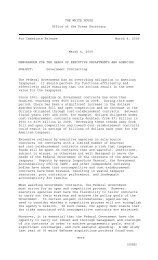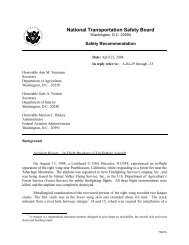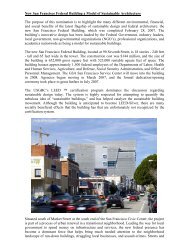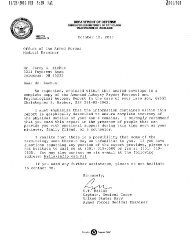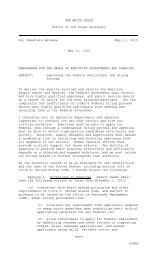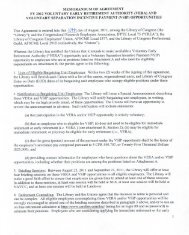Accenture's fifth annual global e-government study
Accenture's fifth annual global e-government study
Accenture's fifth annual global e-government study
You also want an ePaper? Increase the reach of your titles
YUMPU automatically turns print PDFs into web optimized ePapers that Google loves.
ehavior on eGovernment sites, will now be carried<br />
out quarterly (effective November 2003). Results<br />
from a Swedish <strong>government</strong> <strong>study</strong> showed that<br />
between February and April of 2003, close to twothirds<br />
of all active Internet users in Sweden visited a<br />
website of a <strong>government</strong> agency or a local authority.<br />
It is important to note that while usage is measured,<br />
very little has been done within the Swedish <strong>government</strong><br />
in terms of rating the content and maturity of<br />
public-sector websites.<br />
The central <strong>government</strong> is also supporting the agencies<br />
and local <strong>government</strong>s by developing models<br />
that can be used for measuring tangible benefits of<br />
eGovernment if they choose to do so. This project<br />
will also provide guidance for apportioning funding<br />
contributions when agencies make joint investments<br />
in information technology infrastructure.<br />
In October 2003, the <strong>government</strong> appointed a delegation<br />
of members from central and local <strong>government</strong>,<br />
the industry and academia to increase the cooperation<br />
between the public and private sectors in developing<br />
e-services for the public sector. The delegation is<br />
seen as the cornerstone of the <strong>government</strong>’s plans<br />
to accelerate the development of online public services.<br />
Its main task will be to promote cooperation<br />
and provide visionary and innovative thinking, while<br />
focusing on concrete actions (including proposing<br />
funding arrangements for helping agencies and local<br />
authorities to implement the 24/7 Agency concept).<br />
Simultaneously, the <strong>government</strong> presented an information<br />
technology political strategy group with the<br />
task of advising the <strong>government</strong> on how to create<br />
an information society that includes all citizens. This<br />
group also has members from the private sector and<br />
will report to the Ministry of Industry, Employment<br />
and Communications.<br />
While eGovernment services are dispersed in Sweden,<br />
the central <strong>government</strong> has made some effort to<br />
bring access to these services into a central location.<br />
The Swedish portal, www.sverigedirekt.se, is not<br />
categorized by user intention, but rather by <strong>government</strong><br />
organization. While there are plans to make<br />
the portal more intentions based, the Swedish<br />
Agency for Public Management wants to keep it as<br />
an orientation portal. There are no plans for making<br />
it the entry to the public sector for all citizens; the<br />
Swedish Agency for Public Management claims that<br />
portal usage is very low, as people tend to know<br />
their agencies and authorities and thus go directly<br />
to these sources instead of using the central portal.<br />
A number of individual services in Sweden are highly<br />
innovative. The Swedish National Market Board online<br />
service (www.ams.se) not only advertises vacancies<br />
but also allows job seekers to upload their curricula<br />
vitae. Potential employers can then match skills and<br />
competencies to their vacancies through a range of<br />
databases covering such specialist areas as education,<br />
art, photography and the performing arts.<br />
A few interesting examples of short messaging service<br />
use in Sweden can be found in the City of Stockholm,<br />
which has piloted two such services that will be<br />
implemented on a wider scale. In one project, substitute<br />
home-helpers who take care of disabled people<br />
are contacted through group short messaging service.<br />
Previously, coordinators spent approximately<br />
two hours every morning calling possible substitutes<br />
for regular staff who were absent. Now, a group<br />
message is sent out to all persons in the substitute<br />
pool and those available usually call within 10 to 15<br />
minutes. In another pilot, some schools in Stockholm<br />
regularly send a short messaging service message to<br />
parents whose child has skipped a class.<br />
Promotion of eGovernment services in Sweden is<br />
very sparse. Interestingly, however, some studies<br />
indicate that Sweden has one of the highest usage<br />
levels of eGovernment <strong>global</strong>ly. Our own citizen survey<br />
found that three out of four Swedish Internet<br />
users have visited an eGovernment website, with<br />
just under one in five doing so regularly. These numbers<br />
are significant. Sweden has a very high Internet<br />
penetration rate, which means a very large portion<br />
of the general population already has had some<br />
experience with eGovernment.<br />
Sweden has one of the most different eGovernment<br />
programs of any of the 22 countries surveyed in<br />
this report. The noninterfering policy of its central<br />
<strong>government</strong> means that the program is highly<br />
decentralized; yet this does not seem to have posed<br />
many problems for the citizenry to date. Usage of<br />
<strong>government</strong> websites is still quite high. However, the<br />
<strong>government</strong> may be underestimating the potential<br />
of a well-designed user-centered portal. If more<br />
focus were spent on aggregating and enhancing<br />
services, more people might use the portal on a<br />
regular basis for an overall improved experience.<br />
101





